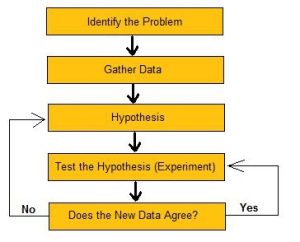Scientific Method Restored to Science Education in North Carolina
By Gregory Wrightstone
As a physicist, John Droz holds in high regard the Scientific Method, a 400-year-old approach to investigating reality.
Rooted in Isaac Newton’s work, which included creation of the calculus, the Scientific Method has long underpinned examination of the physical world and technological advancement.

Image: CK-12 Foundation, via Wikimedia Commons // CC BY-SA 3.0
Quite understandable it is, then, that Droz, who holds degrees in mathematics and physics, was prompted to do some investigating of his own after learning that his state of North Carolina had abandoned the teaching of the Scientific Method for the promotion of a faddish theory of entirely unscientific inquiry.
“Upon reading a review of the North Carolina K-12 Science Standards, I was concerned that nowhere was the Scientific Method even mentioned,” says Droz, who retired at 34 as a successful investor and launched a 40-year career as a “citizen advocate” of wide-ranging pursuits.
Having a particular concern about the current state of critical thinking, Droz ultimately filed a written complaint with the North Carolina Department of Public Instruction.
“They subsequently said that they had received some 14,000 inputs on the Science Standards, and apparently, I was the only one bringing up the issue,” said Droz, whose varied interests include climate science and election integrity.
The controversy had its beginnings in 2012 when a newly formulated Next Generation Science Standards (NGSS) began nudging out the Scientific Method from much of public education. Politically inspired by progressive ideology and backed by the National Research Council, National Science Teachers Association and the American Association for the Advancement of Science, the NGSS gained favor with the education bureaucracy of 45 states. The Scientific Method was replaced by something called “Science and Engineering Practices.”
Much of the public might not appreciate the implications of the Scientific Method’s fading from public education’s officialdom, but the loss is no less than a disaster to scientists and adherents of the traditional tenets of critical thinking.
The Scientific Method requires that questions be asked, observations made, and hypotheses formulated, tested, and proven or rejected. Conclusions are always subject to challenges with new evidence and insights.
The NGSS scraps this centuries-old process for computer models whose products are proof of nothing unless they are verified against real-world data and survive the challenges of new information. However, those criticizing the findings of this corruption of objective inquiry are often dismissed as “science deniers.”
Nowhere have the dangers of this travesty been more manifest than in climate science where a paganistic fervor has supplanted rigorous investigation and open debate. Challengers of the status quo are more likely to be met with ad hominem than data. Ideologically driven activists use flawed computer models to justify political actions like banning gas-powered cars, shutting down pipelines and spending trillions on “green” energy subsidies that provide no benefit to society.
In classrooms, students are encouraged by the NGSS to conform to politically correct views: Solar and wind energy are good. Fossil fuels are bad. Catastrophic global warming is the future. Carbon dioxide, a gas necessary for life itself, is pollution. Computer models that fail to predict weather days or months in the future can divine the behavior of the climate, Earth’s most complex system, in the next century. Questioning the most absurd of hypotheses is heresy.
Fortunately for North Carolina students, two members of the 18-person State Board of Education embraced Droz’s view that the Scientific Method should be restored to the state’s Science Standards, which it was in July. Droz said the support of the board members was instrumental in correcting the deficiency in state standards.
“I’m optimistic that the Department of Public Instruction will soon address my second major concern that the state Science Standards need more specificity regarding critical thinking,” says Droz. “It should be clear that there is an intimate connection between critical thinking analysis and the universal problem-solving procedure of the Scientific Method.”
John Droz’s example of standing for scientific integrity is an inspiration to the CO2 Coalition, of which he is a member. Determined to reverse the education establishment’s degradation of science teaching, the CO2 Coalition has created educational materials for students and educators.
The CO2 Learning Center’s books, videos and lesson plans are free for the asking. The cost of failing to repel the modern attack on rational thought is incalculable.
This commentary was first published at American Thinker, October 27, 2023.
Gregory Wrightstone is a geologist; executive director of the CO2 Coalition, Arlington, VA; author of Inconvenient Facts: The Science That Al Gore Doesn’t Want You to Know and the soon-to-be-published book, A Very Convenient Warming – How Modest Warming and More CO2 are Benefiting Humanity.
